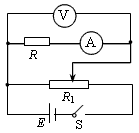问题
实验题
有一根长陶瓷管,其表面均匀地镀有一层很薄的电阻膜,管的两端有导电箍M和N,如图所示。用多用表电阻档测得MN间的电阻膜的电阻约为100 ,陶瓷管的直径远大于电阻膜的厚度。某同学利用下列器材设计了一个测量该电阻膜厚度d的实验。
,陶瓷管的直径远大于电阻膜的厚度。某同学利用下列器材设计了一个测量该电阻膜厚度d的实验。

A.刻度尺(最小分度为mm)
B.游标卡尺
C.电流表A1(量程0~300mA,内阻约0.2 )
)
D.电流表A2 (量程0~100mA,内阻约0.6 )
)
E.电压表V1 (量程10V,内阻约5k )
)
F.电压表V2 (量程5V,内阻约3k )
)
G.滑动变阻器R1 (阻值范围0~50 ,额定电流1.5A)
,额定电流1.5A)
H.滑动变阻器R2 (阻值范围0~1.5K ,额定电流1A)
,额定电流1A)
I.电源E (电动势9V,内阻可不计)
J.开关一个,导线若干
(1)他用毫米刻度尺测出电阻膜的长度为l,用游标卡尺测量该陶瓷管的外径D。为了比较准确地测量电阻膜的电阻,且调节方便,实验中应选用电流表______________,电压表______________,滑动变阻器______________。(填写器材前面的字母代号)
(2)画出测量电阻膜的电阻R的实验电路图。
(3)若电压表的读数为U,电流表的读数为I,镀膜材料的电阻率为 ,计算电阻膜厚度d的数学表达式为:d=______________(用所测得的量和已知量的符号表示)。
,计算电阻膜厚度d的数学表达式为:d=______________(用所测得的量和已知量的符号表示)。
答案
(1)D,E,G
(2)
(3)
